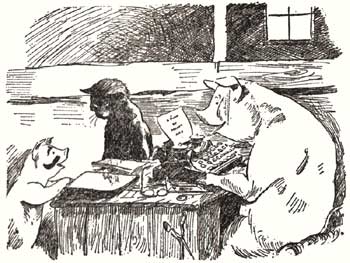Freddy's Cousin Weedly
by Walter R. Brooks
illustrated by Kurt Wiese
Knopf: New York, 1940
283 pages
Overlook Press, New York, 2002
283 pages
A virtuoso appeal from Jinx, the black cat
Excellent for younger readersThe house was shut up tight, but there was a light in the parlor window. Jinx mewed at the door to get in, and then he jumped up on the sill and mewed at the window. He could see a tall bony woman sitting at the table .... She had a black silk shawl around her shoulders and a funny old-fashioned bonnet on her head, and when she lifted the cup she held her little finger out straight.
Jinx had used his saddest and most mournful mew. It made you think of little children crying and cats dying of starvation and all sorts of sorrowful things, and you would be pretty hard-hearted if you could keep from going to the door. But the woman didn't even look up. So Jinx made the mew even more heart-rending until you would think that he had the most awful stomach-ache that any cat ever had.
 Freddy's Cousin Weedly is one of Walter R. Brooks' greatly enjoyable Freddy the Pig series of children's novels. It was the seventh to be published, in 1940; but can be read independently. See the series discussion at Troynovant for some background material.
Freddy's Cousin Weedly is one of Walter R. Brooks' greatly enjoyable Freddy the Pig series of children's novels. It was the seventh to be published, in 1940; but can be read independently. See the series discussion at Troynovant for some background material.
I suggest Freddy's Cousin Weedly as a particularly good book to introduce younger children to the Freddy the Pig series. The plot is in the broad middle range of the series for complexity, but in this novel the essential benevolence of Brooks' rural world has only the lightest touches of villainy or scariness. There are no life-or-death challenges, and no really bad characters.
Weedly is a very young pig, fearful and shy. Jinx the black cat, and Freddy bring Weedly back to the Bean Farm to give him some education and independence. Jinx, Freddy, and the others think up some useful tricks to help Weedly over his fearfulness and shyness. Not surprisingly, these devices work all too well. How to reach a civil balance without undoing everything?
Another problem in Freddy's Cousin Weedly is the presence on the farm of some relatives of the Beans while the latter are on vacation in Europe. These folks are not used to dealing with animals as reasonable individuals, or indeed at all with animals that can talk. There's a long-standing dispute about a silver family heirloom, which the Bean Farm animals are drawn into, as is Freddy's friend the Centerboro sheriff.
Like Weedly's fearfulness and then brashness, the problem of the relatives and the heirloom is one of sociability and civility, rather than legality or danger. Younger kids will recognize Weedly's situation as well as the tussle over the heirloom. Brooks works through everything according to the individual characters involved, animals as well as humans. Alice and Emma the ducks, Mrs. Wiggins and her sisters the cows, Charles and Henrietta the chickens and their large brood, Hank the old white horse, Mr. and Mrs. Webb the spiders, and other farm and woodland animals help out.
When the Bean Farm animals receive invitation-cards for a mildly formal party, none of them know what the appended initials R.S.V.P. stand for. They turn to Freddy as the most widely-read to explain the little mystery. Freddy naturally has no idea either, but thinking fast and creatively, manages to decode the initials as Refreshments Served Very Promptly. This of course is much more enticing than the society-French which is the official interpretation, and if widely so understood, would bring more invitees to parties. I'll wager that Brooks prefers this version, and I'm sure Freddy does.
"So that's it?" said Mrs. Wiggins. "Now that's the kind of invitation I like to get. Well, come along, girls. We might as well go back to the pasture and practice a little politeness ourselves. Because the politer you are at a party, the more you can eat without anybody noticing it."
© 2002 Robert Wilfred Franson
Annotated list of Walter R. Brooks'
Freddy the Pig series
Juvenile at Troynovant
for a younger audience
| Troynovant, or Renewing Troy: | New | Contents | |||
| recurrent inspiration | Recent Updates | |||
|
www.Troynovant.com |
||||
|
Reviews |
||||
| Personae | Strata | Topography |
|
|||